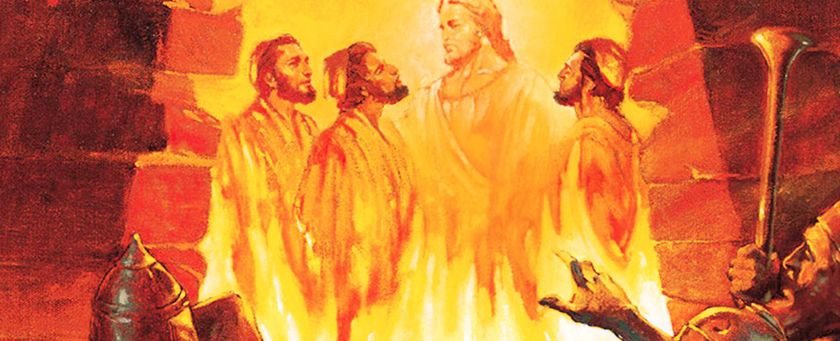How Do We Respond When Our Faith is Tested?
Wednesday of the Fifth Week of Lent

Readings:
Dn. 3:14-20, 91-92, 95; Dn. 3; Jn. 8:31-42
The passages from the Book of the Prophet Daniel are related. One would do well to read the chapter in its entirety, however, suffice it to say the First Reading gives us the beginning and the end, while the Responsorial Psalm is the taken from the middle of the chapter (the Psalm is the song the men sang in the midst of the flames). The prophet Daniel lived during the Babylonian Exile and because of his ability to predict the future, a grace sometimes given to prophets, King Nebuchadnezzar assigns Daniel and his companions an advisory role in his administration. This was common practice for the Babylonians, who often took the most gifted and wise people from the nations they conquered and put their talents to good use. This was contrary to how the Assyrians dealt with people during the previous exile, choosing rather to remove all leaders from any position of power. What the Ancient Babylonians realized was that the people were more likely to trust in leaders they already knew. This was a relatively successful means of takeover, which endured for the better part of a century, but it was not to last. The ancient faith of the people of Israel would not succumb to the idols of Babylon, and were later freed and restored to Jerusalem by the Persians.
Our First Reading is an endearing passage from the Book of Daniel, chapter 3. In it we see three Israelite men, Hananiah, Mishael, and Azariah, renamed Shadrach, Meshach, and Abednego. These latter names were given to them as a means of forced assimilation. In other words, with these new names, they were to accept a new way of life, which included worshipping a different and false god. The early chapters of the Book of Daniel are marked by peaceful protests against this kind of forced assimilation. And in yet another act of quiet protest, Hananiah, Michael, and Azariah refuse to bow down to the god of the Babylonians. This, naturally, angers the king, who sought to immediately make an example of their rebellion in front of all the people. He orders to have the furnace heated to its hottest and have the three men tossed into the fire. The faith of Shadrach, Meshach, and Abednego, however, is strong. They know in their heart of hearts that God is with them, even in exile. They know that the Lord would never abandon them so long as they do not turn their backs on Him. So, as they are tossed into the fire, bound hand and foot, their faith allows them to be free of their bindings and they begin blessing the Lord. The image is striking: Three men, arrested for refusing to worship a false idol, tossed into a white-hot fire, are seen dancing and singing God’s praises. Not only that, a fourth figure—one resembling a Son of Man—is present with them. Clearly God never abandons those who persevere in faith.
Our Gospel passage deals with a similar situation: Jesus accuses the Jews who believed in him of not following the One True God. This is curious. What is John trying to tell us about the Jews who believed in Jesus? It would seem as though they were still hanging on to the traditions of their ancestors rather than the new wine that Jesus is preparing them to receive. It would seem these particular disciples are worshipping an idol. In this case, Jesus says they are following their “father” with a small “f”. In those days, it was not uncommon to call one’s teacher father, as it still is today. We call priests “father” as a way of acknowledging their teaching role within the community. But, Jesus is accusing the Jews of following the wrong father. If they recognized Jesus as the Son of God, they would also recognize what Jesus says: “If you remain in my word, you will truly be my disciples, and you will know the truth, and the truth will set you free.” But, since many of them have refused to let go of their former way of life, namely, the teachings of their “fathers,” that is, their father’s words, they will remain slaves to sin. Only the words of Jesus are pure truth.
The mechanisms of the world are not like the mechanisms of heaven. The Son of God has come to remove the veil that has kept so many clouded in darkness. That is why Jesus says, “I am the Light of the world” (Jn. 8:12). He shines a light on the corruption of humanity and the evil that ensues because of it. And, difficult as it may be to accept that truth, for those who do, they are freed from their slavery to sin and death. That is the true test of faith. In a world that seeks to fill our heads with all sorts of nonsense about what to believe, Jesus comes to show us, through his own words, the way to holiness, the way to peace, the way to life.
So, how will we respond to Jesus’ invitation to truth and faith? Will we continue to follow the traditions of our fathers and what the world wants us to believe? Will we worship false idols? Or, will we turn away from the lies that have been fed to us so that we may come to the truth? There is only one way there: Jesus. Let us seek truth, then, so that Truth can set us free.
Given during the COVID-19 pandemic.





Share this post
Twitter
Facebook
Pinterest
Email